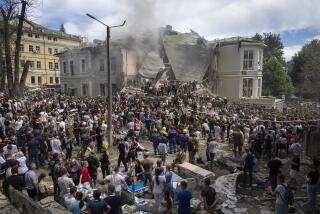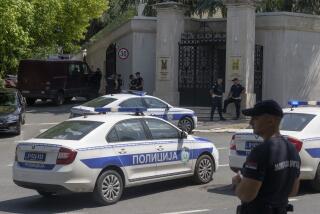NATO Planes Hit Chinese Embassy in Belgrade; 2 Die
- Share via
BELGRADE, Yugoslavia — NATO warplanes pounded Belgrade early today, hitting the Chinese Embassy, setting it ablaze and killing two. The attack, hours after allied cluster bombs killed 15 civilians in the city of Nis, angered Yugoslav President Slobodan Milosevic’s government as it was signaling a willingness to discuss a peace plan for Kosovo province.
A report from a Chinese correspondent on the scene said the multistory embassy had been hit with three missiles from different angles, one that plunged down from the fifth floor of the embassy to the first floor. Another missile hit the side of the building on the fourth floor.
The New China News Agency said two people were killed, including one of the news service’s correspondents, and said more than 20 people were injured. Two people were missing.
As firetrucks converged on the smoking building, witnesses saw dazed employees running into the street and an unconscious person being removed on a stretcher. Two gaping holes were visible in the embassy building, and a 6-foot-deep crater was blown out at one corner.
The bombing was part of the heaviest NATO assault on the Yugoslav capital in four nights. Lights went out across the city of 2 million people shortly after 9 p.m. Friday, apparently after NATO sabotaged a power station for the second time this week.
After news of the bombing hit, the U.S., British, French and Russian ambassadors scurried to answer China’s angry call for an emergency session of the Security Council, which met into the early hours of today.
The attack could jeopardize the search for peace in Yugoslavia. China, a vocal opponent of the NATO bombing campaign since it began March 24, is a permanent member of the Security Council. Its support is necessary if the United States, Russia and other members of the Group of 8 industrialized nations are to gain U.N. approval for a plan they drafted Thursday to end the conflict in Yugoslavia.
In Beijing, the bombing topped the national noon newscast, with a statement read out expressing the Chinese government’s “utmost indignation” of “the barbarian act.” Beijing called it “a brutal violation of China’s sovereignty” that contravened international convention and law. The statement strongly condemned NATO’s action and said Beijing “reserved the right to take further action.”
China’s embassy is in New Belgrade near studios of the pro-government BK Television, a more obvious NATO target, which was also damaged in the attack and knocked off the air.
NATO officials said today that their warplanes did not target the Chinese Embassy. But they did acknowledge a daylight cluster bomb attack on Nis, where explosions ripped through a crowded outdoor market and a hospital complex.
Residents in Nis said bombs burst overhead and scattered scores of beer-can-size “bomblets” that floated to Earth on tiny white parachutes and exploded on impact, spraying fire and deadly metal fragments into homes, outdoor market stalls, cafes, cars and two hospital buildings. More than 30 people were seriously wounded, doctors said.
U.N. Secretary-General Kofi Annan was “shocked and distressed” by the bombings in Belgrade and Nis, a spokesman said, and called for “an urgent political solution” in Kosovo.
NATO is demanding political autonomy and security for the ethnic Albanian majority in Kosovo, a province of Yugoslavia’s dominant republic, Serbia. Yugoslav forces have driven hundreds of thousands of Albanians from their homes before and since the bombing started.
On Friday, Yugoslavia’s state-run Tanjug news agency said Milosevic would consider--and might eventually accept--the plan outlined in principle by Russia and Western powers. The plan calls for an international peacekeeping force in Kosovo and a withdrawal of at least some Yugoslav troops.
But Tanjug repeated the government’s insistence that NATO first stop the bombing, and the government’s rhetoric turned angry after the bombings in Belgrade and Nis.
“Is it possible that something like this was done only a day after we came closer to a peace agreement?” asked Serbian Deputy Prime Minister Milovan Bojic, standing in front of the damaged hospital in Nis.
Yugoslav Foreign Minister Zivadin Jovanovic called the embassy bombing “unbelievable.”
“Now I would like to see how NATO will justify this,” said Goran Matic, a government minister without portfolio. “It’s time to end this madness. Everybody has to sit and talk.”
In other developments Friday:
* The Clinton administration said its chief Russia strategist, Deputy Secretary of State Strobe Talbott, would visit Moscow next week to attempt to hammer out the details of Thursday’s initiative. Officials said Russia and the West are still far apart, despite dramatic progress made during the talks in Bonn.
* The U.N.’s Annan named Sweden’s former prime minister, Carl Bildt, as one of two special envoys to help him search for a political solution to the crisis, diplomats said. The other envoy is Eduard Kukan, Slovakia’s foreign minister.
* The Office of the U.N. High Commissioner for Refugees warned that it was running out of cash to handle the exodus of ethnic Albanians from Kosovo. An estimated $12 million that was available earlier this week was used to pay off bills. The agency estimates that it needs $40 million more for May alone.
* The U.N. Security Council put off a vote on a resolution condemning the plight of Kosovo refugees because of discord among permanent members, including the United States and Russia.
* In Kukes, Albania, thousands of refugees convened in the main square Friday night for a rousing peace concert aimed at raising the spirits of those displaced from Kosovo.
* Under a 1994 agreement on European confidence and security-building measures, Russia asked to inspect the 16,000-troop contingent NATO is massing in Macedonia, just south of Kosovo.
U.S. officials cautioned that the Group of 8’s outline of a peace plan was only the beginning of a proposal that would go to Milosevic.
State Department spokesman James P. Rubin said NATO and Russia still disagree on the composition of an international peacekeeping force, as well as on other significant details. Settling those disputes, Rubin said, “is going to be a difficult process.”
Nevertheless, he said the United States and its allies “are now operating on two tracks”--diplomatic as well as military--in looking for a common strategy for ending the conflict.
President Clinton told reporters that he envisions a NATO-led force like the one that has been keeping peace in Bosnia-Herzegovina since a 3 1/2-year war ended in that nation in 1995.
“I think it will work best if we have a system like we had in Bosnia, where there was U.N. approval, NATO was at the core of the force, but there was Russian participation, there was Ukrainian participation, there was participation from a lot of other countries,” Clinton said.
The remark prompted a flurry of speculation that Clinton was advocating an ethnic partition of Kosovo, similar to the partitioning of Bosnia. But administration officials insisted that NATO does not foresee any sort of partition in Kosovo.
U.S. officials said that NATO, like Russia, wants Milosevic to approve any deployment of peacekeeping troops. They said the bombing will continue in an effort to force that approval.
Milosevic “has only two choices--either to reverse course or to face an intensifying, punishing military campaign,” Rubin said.
NATO officials say the bombing assault is to intensify, with 176 more aircraft, including strike planes and tankers, set to join the operations soon.
“We will be in an even better position with these extra assets to operate seven days a week, 24 hours a day,” alliance spokesman Jamie Shea said. “It has never been so true that NATO never sleeps.
Already the number of daylight attacks is increasing--like the one Friday on Nis, a city of 250,000 people--but so is the number of wayward bombs.
Planes roared over the city, 140 miles south of Belgrade, about 11:50 a.m., 10 minutes after wailing sirens sounded an air raid alert, residents said.
Reporters escorted to the city by police found human carnage up and down the block of Aneta Andrejevic Street that abuts the city’s Central Market.
“It would be better if I had died than to see all this,” said Smilja Djuric, 73, as she emerged from her basement, stunned and quivering, to find three bodies near her doorstep amid burned-out cars, fallen tree branches and shattered glass.
One corpse was that of an elderly man who appeared to have been selling cardboard egg cartons that were stored flat in a box at his feet. He lay as stiff as a mannequin on his back, his mouth open in a dying gasp. Blood was caked between his eyes.
Nine dead were found near the market and three others on a residential street behind the hospital, about two miles away, doctors said. Three others died after being rushed to the hospital’s emergency room.
NATO acknowledged aiming cluster bombs, which are used to pierce tank armor and aircraft, at Nis’ military airport. NATO said it was “highly probable” that one cluster bomb hit a residential neighborhood. The airport is more than half a mile from the market or the hospital, but the hospital is a few hundred yards from an army barracks.
“There was a big explosion and after that a lot of smaller explosions that sounded like machine-gun fire,” said Cedo Kutlesic, general manager of the hospital, the largest in southern Serbia. One employee there said he heard about 50 small explosions.
“Those who fly those planes, I’m not sure they are human; maybe they’re some kind of aliens,” Serbian Health Minister Lebosava Milicevic told reporters at the hospital. “To fly a plane in my country, you need a doctor’s certificate saying you’re normal. I can’t believe those pilots have such a document.”
The smell of gunpowder hung in the air around the hospital and the Central Market. Police warned residents to beware of about 50 unexploded “bomblets” that remained on the streets, and reporters counted half a dozen of the yellow canisters--clearly marked BLU-97, indicating they are part of CBU-87 cluster bombs.
Two heavier bombs fell on a village-like suburb of Medosevac, about 500 yards from Nis’ military airport, at 2:50 a.m. and 4:15 a.m., leaving an 8-foot-deep crater in a dirt road and destroying about 15 houses. Four people were wounded.
“This is not war, it’s a crime,” said Zoran Avramovic, 56, who survived the bombing in his basement, then dug himself, his wife and 77-year-old mother out from the ruins of his flattened house with a shovel. “War is fighting face to face. Let NATO come here and take us on.”
Stung by news of the civilian casualties in Nis, the Pentagon offered a new catalog of Yugoslav army atrocities.
“Our policy is to avoid civilian casualties,” Pentagon spokesman Kenneth H. Bacon said. “We know that we make mistakes from time to time. But Milosevic’s policy is to [inflict] civilian casualties.”
Bacon said 100,000 military-age Albanian men are “missing.” The figure was obtained by estimating the number of men that would have been expected to be among the refugees in neighboring countries if the refugee population had the same demographic profile as the prewar population.
*
Boudreaux reported from Belgrade and Dahlburg from Brussels. Times staff writers Norman Kempster in Washington; Janet Wilson at the United Nations; Alissa Rubin in Brussels; Richard C. Paddock in Moscow; Marc Lacey in Kukes; David Holley in Podgorica, Montenegro; and Henry Chu in Beijing contributed to this report.
More to Read
Sign up for Essential California
The most important California stories and recommendations in your inbox every morning.
You may occasionally receive promotional content from the Los Angeles Times.













